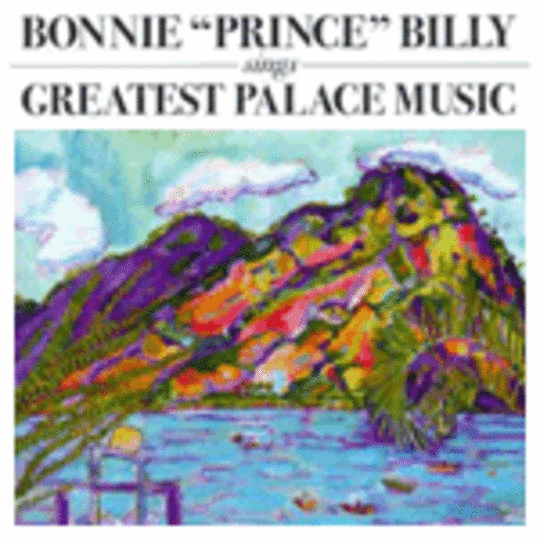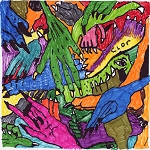For the hard-boiled Nashville hack, it must be the ultimate smack in the mouth. Slapped at the end of his inessential covers EP More Revery, Will Oldham drawls through a version of trad-country bore Tim McGraw’s cliché-driven dirge Just To See You Smile. With its Palace-like production and Oldham’s blue-collar croon, it sounds ironic, cloying and cocksure – and yet boasts of a beauty unknown to the charmless, toiling, production-line plod of the original. However, despite the belligerent, throwaway allure of that record, it also proved to be an early indication of where this wayward country contrarian was going to take his music next.
As an art-school-savvy ex-child actor more suited to the throbbing hipster’s paradise of Williamsburg than open-mic nights in mid-western bars, it might seem strange that Oldham chose to re-record some of his best-loved Palace-era material with a cast of Nashville sessionists that have worked with the likes of Kenny Rogers, Randy Travis and Shania Twain. After all, not only is material from the likes of himself, Howe Gelb, Jeff Tweedy and even Ryan Adams regarded with everything from suspicion to outrage by the Music City establishment, but many of his followers hold the brittle, low-fi, tin-can recordings of Palace Brothers in much higher esteem than the more produced, studio-based offerings seen in the likes of last year’s Master & Everyone.
Yet that is exactly what Will Oldham has done. On Greatest Palace Music – his fourth full length as Bonnie ‘Prince’ Billy – Oldham has dressed his tales of sex, death, depression and pitch-black humour in the traditionalist stylings of Hank Williams, The Carter Family, and even the critically-despised commercialised country of the mid-90’s. Surprisingly, it has also led to one of the warmest, most moving and human records he has ever released.
Inevitably, anyone acquainted with the Palace era will double-take from the moment they hear the first, triumphant strains of opening track New Partner. The soft-rock guitar lines, the subtle, fiddle-based embroidery and the chorus of pitch-perfect backing singers all seem a world away from the sparse, lonesome strum at the heart of Viva Last Blues. But aside from the grand augmentations, at its heart is the same song made more soulful and arresting through its harnessing of that classic sound.
It’s something that continues throughout much of the record. The finest moments on Greatest Palace Music are much similar in structure and melody to the originals, yet seize upon elements of the full-band at his disposal, to build something which touches in entirely new ways. Agnes, Queen of Sorrow is rendered as a love-stained, Gram Parsons/Emmylou Harris-esque duet; with Oldham playing the gruff, bumbling beast to his partner’s beautiful, cut-glass clear voice. The lonely, empty-room lament of You Will Miss Me When I Burn is made all the more desperate by this version’s weeping slide guitar and half-sung backing vocals, proclaiming ‘if you have no-one, no-one can hurt you.’
Naturally, not every recreation is quite so successful. The varnished sheen provided by fiddle & slide-guitar parts smothers the simmering torment of No More Workhorse Blues, and Viva Ultra is a sanitised facsimile of the fraught black-eyed blues of the original. There are also times when Oldham’s vocals seem disinterested; giving the sense that he realises that some of these versions lack the fear & loathing which simmers throughout the Palace back-catalogue – as though he knows he’s squashing his songs into forms they cannot hold. However, much of this is down to editing; had the album been a solid 11 songs rather than a sprawling 15, Greatest Palace Music may have held our gaze with greater ease. But then, what kind of best-of would that have been?
The two truly divisive moments here are found in the closing I am a Cinematographer and I Send My Love to You – transformed from an exquisite confession of devotion into a tongue-in-cheek, honky-tonk hoedown, complete with quacking sound effects and rag-time piano. It’s here where Oldham’s audience is forced to decide whether or not this whole project is just an elaborate joke to frustrate and alienate his fans.
He certainly leaves it late in providing us with the answer. With a brute choir and an empty-whisky-bottled, bar-room stumble of a tune, I am a Cinematographer completes his homage to country music in the most fitting way possible – through a drunken sing-a-long. Throughout out the album, Oldham paints a country music of sin and redemption, love and death; that can display the human heart in all its naked, bashed-in beauty, and also sound as hopelessly flawed, crass and clichéd as real life.
Of course, given his impulsiveness, where Oldham takes his Palace songs, his ‘Prince’ Billy persona and his buck-toothed country blues next is anyone’s guess. But one thing is certain; in Greatest Palace Music, he has made a bold, frequently beautiful record that confounds his critics and challenges his fans, where Will Oldham has burnt all his bridges, and left himself standing in a field of his own.
-
8Neil Robertson's Score





















